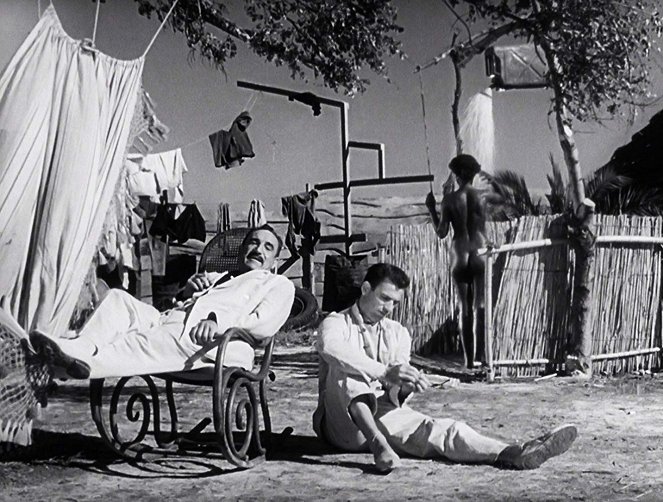Directed by:
Henri-Georges ClouzotCinematography:
Armand ThirardComposer:
Georges AuricCast:
Yves Montand, Charles Vanel, Antonio Centa, Peter van Eyck, Véra Clouzot, Folco Lulli, Darío Moreno, Grégoire Gromoff, Darling Légitimus, François Valorbe (more)VOD (3)
Plots(1)
In a small, isolated, hot and dusty Central American village, there's only one thing to do: dream of getting out. An opportunity for escape presents itself -- but only to those with nerves of steel. An American oil company has offered to pay big bucks to get two trucks filled with nitroglycerin over to a well fire. The catch: the unpaved terrain contains enough bumps and crags to make the unstable material explode... and instantly kill the driver. Nonetheless, the company has many applicants hungry for work, and a quartet of the coolest are chosen. But even these stalwart men will discover that fear of their deadly payload can ignite even the most frozen emotions. (official distributor synopsis)
(more)Reviews (7)
A textbook thriller. Luckily I saw Friedkin’s remake before this (let’s be honest, although it’s excellent, it doesn’t come anywhere near this pearl of cinematography), because this ride is... well, hold on tight! A great introduction sequence, overflowing with snappy lines (the choice of dubbers was perfect) and then nerve-racking journey with the truck full of rattling crates of nitroglycerin. None of it can compete with the qualities of Friedkin’s bridge crossing, but in terms of characters, this one wins hands down. The actors led by Yves Montand and Charles Vanel are perfect for their roles and particularly Montand’s Mario is a perfect swine. "A man who drinks only water wants to order me around like some lord. Rosa, bring water, the gentleman is thirsty."
()
Utterly unique. The most suspenseful or second most suspenseful movie I've ever seen. The first hour is a boring but absolutely necessary preparatory manoeuvre for an uncompromising and formally riveting spectacle, which even today ranks in my eyes among the top of several genres. Rarely do we, as viewers, feel such fear and excitement just because the camerawork is flawless and the actors perform as if their lives depended on it, and it's really rare how the psychologically and visually exquisite anxiety builds up precisely throughout the long 150 minutes. The closing five minutes may be a bit too out of context, but the rest is undoubtedly among the best cinema has to offer – I've probably never been this emotionally drained after a black and white film. 100%
()
A film that is 60 years old, two and a half hour long and yet it kept me in suspense the way not many things can. The Wages of Fear aroused a brutal fear in me, so it fulfilled its goal. Some might be upset that the film drags a lot in the first hour. For me, it was possibly the best part. During the first hour the story was basically non-existent. The cameraman walked around the village with a camera and filmed the lives of French workers. He watched what they did, how they worked and what they dreamed about. For a sixty-year-old film there were some pretty interesting ideas. For example, nowadays you couldn’t even imagine living like that. Well, things were different back then. After all of this, however, it turns into pure despair, and the film left me with a huge lump in my stomach from the stress it caused me. Well done, that’s exactly what I had imagined it to be.
()
“The Wages of Fear is probably the best thriller in world cinema because the suspense doesn’t come from an artificial construct, but from real life." British film critic, Basil Wright, 1972. I would just like to add to this that this claim still applies more than twenty-five years later. And the movie is better than the book it is based on, which, however, certainly deserves no high praise.
()
It’s hard to say which version is better. Both have their emotional peak, the French one in the form of a crossing over an oil pond and its tragic consequence, while Friedkin's has an unforgettable scene a crossing a rope bridge over a raging river. Otherwise they are both completely different and complement each other beautifully. Perhaps only the French original has an unnecessarily long introductory part, which lasts more than an hour and needs to be cut, but otherwise it is a hearty portion of first-class filmmaking. And young Yves Montand looked like David Gahan from Depeche Mode :o)
()


Ads